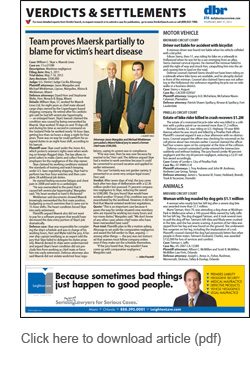Daily Business Review

Case no: 11cv21589
Description: Maritime negligence
Filing date: May 5, 2011
Trial dates: May 7-16, 2012
Jury decision: $590,000
Judge: U.S. District Judge Cecillia Altonaga
Plaintiff attorneys: Jason Margulies and Michael Winkleman, Lipcon, Margulies & Winkleman, Miami
Defense attorneys: David Horr and Stephanie Wylie, Horr, Novack & Skipp, Miami
Details: William Skye, 57, worked for Maersk Lines Ltd. for eight years as a chief mate aboard cargo ships owned by the Copenhagen-based shipping company. He retired after his cardiologist said he had left ventricular hypertrophy – an enlarged heart. Skye’s lawsuit claimed the condition was caused by being overworked by Maersk. Skye worked 70 days on and 70 days off, and during his time as second in command on the Sealand Pride he worked nearly 16-hour days, getting less than six hours a sleep a night for four years. There was no way he could perform his assigned duties in an eight-hour shift, according to this lawsuit.
Plaintiff case: Skye sued under the Jones Act, which protects seaman’s rights even when working on foreign-flagged ships. The law allows injured sailors to make claims and collect from their employers for the negligence of the ship owner. Skye claimed his working conditions violates the standards of training and watch keeping under U.S. laws regulating shipping. Skye had to perform two four-hour watched and then complete 28 additional job duties. He started feeling excessive fatigue and chest pain in 2008 and went to a cardiologist. “He was overworked to the point that is caused his left ventricular hypertrophy,” Margulies said. “His heart worked so hard it thickened.” Winkleman said documents showed Maersk knowingly overworked the first mate position, budgeting so much overtime that it came out to 15-hour shifts. The heart condition forced Skye into early retirement. Plaintiffs argued Maersk also did not want to pay for a software program that would have decreased the data entry portion of Skye’s job dramatically.
Defense case: Skye was responsible for completing the ship’s schedule and was in charge of his working hours, Horr and Wylie told the jury. A former ship captain testifying as an expert told the jury that Skye failed to delegate his duties properly. Maersk denied its ships were undermanned and argued Skye’s heart condition did not preclude him from working as chief mate or force him into early retirement. Defense attorneys also said Maersk did not violate work/rest hour regulations, saying its system was in compliance. “If he was over, then he was over because he wanted to be,” Horr said. The defense argued Skye had a motive to work overtime because it could be converted to accrued vacation and applied to earlier retirement. This case “certainly was not garden variety. It presented to us some very unique legal issues,” Horr said.
Verdict: After seven days of trial, the jury came back after two days of deliberation with a $2.36 million verdict but assessed 75 percent comparative negligence to Skye, reducing the award to $590,000. The jury found Skye would have worked another 10 years if his condition was not exacerbated by the workload. However, it did not find that Maersk violated work/rest regulations.
Quote: “This is an important case because it paves the way for similar situated crew members who are injured by working too many hours and too many duties,” Margulies said. “We don’t know of any other cases where chief mates who have been overworked have sued.”
Post-trial: Plaintiffs plan to file a motion asking Altonaga to set aside the comparative negligence and award the full verdict to Skye, arguing – among other things – the jury was not instructed that seamen must follow company orders even if they make out the schedule themselves. “If the jury heard that, they wouldn’t have come up with comparative negligence,” Margulies said.




